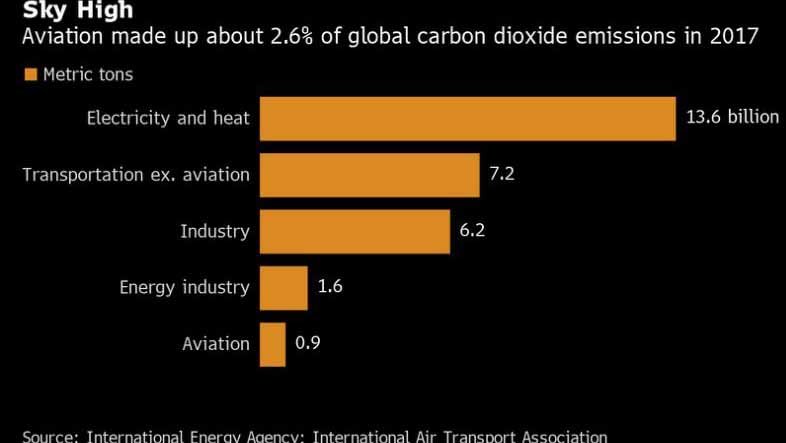Carbon Neutral Now: JetBlue Makes an All-In Move
JetBlue to start flying with sustainable aviation fuel on flights from San Francisco in 2020
January 7, 2020

JetBlue is walking the talk in an announcement today that it will offset carbon dioxide emissions (CO2) from jet fuel for all domestic JetBlue flights beginning in July 2020, making it the first major U.S. airline to take this critical and measurable step toward reducing its contribution to global warming. JetBlue also announced plans to start flying with sustainable aviation fuel in mid-2020 on flights from San Francisco International Airport. The move puts the airline closer to its goal of offsetting of more than 15-17 billion pounds of co2 emissions per year.
The efforts build on the airline’s existing programs like investments in fuel-saving technologies and aircraft, as well as advocating for a more fuel-efficient air traffic control system that would reduce emissions from flying.
“Air travel connects people and cultures, and supports a global economy, yet we must act to limit this critical industry’s contributions to climate change,” says JetBlue CEO Robin Hayes. “We reduce where we can and offset where we can’t. By offsetting all of our domestic flying, we’re preparing our business for the lower-carbon economy that aviation – and all sectors – must plan for.”
Offsetting Emissions From Domestic Flights Starting 2020
JetBlue first began offsetting carbon dioxide emissions with programs to balance customer flying during specific times of year but these latest moves expand those efforts to reduce emissions associated with fuel use in a bigger way.
JetBlue will continue to partner with Carbonfund.org—a leading U.S. based nonprofit carbon reduction and climate solutions organization. Since 2008, JetBlue has already offset more than 2.6 billion pounds of CO2 emissions in partnership with Carbonfund.org. JetBlue’s new carbon offsetting partners now also include established experts in the space – EcoAct and South Pole.
This expansion is expected to offset an additional 15-17 billion pounds (7 to 8 million metric tons) of emissions per year – the annual equivalent of removing more than 1.5 million passenger vehicles from the road. JetBlue will offer ways for the airline’s customers and communities to connect with the carbon offsetting projects JetBlue is engaging with.
Every ton of emissions reduced results in the creation of one carbon offset or carbon credit. A carbon credit is a tradeable certificate that represents the avoidance or removal of one ton of carbon dioxide emissions. Buying carbon credits means investing in emission reduction projects that require carbon offsetting financing in order to take place.
“The airline industry is one of the few industries that has collectively committed to an international emissions reduction goal,” said Hayes. “Air travel brings so much good to the world and JetBlue has always been about making our essential industry better. Carbon offsetting is a bridge to, not a silver bullet for, a lower carbon future. Reducing and mitigating our greenhouse gas emissions is a fundamental aspect of our business plan and our mission to inspire humanity.”
Flying with Sustainable Aviation Fuel on Flights from San Francisco in 2020
JetBlue has agreed to purchase sustainable aviation fuel (SAF) from Neste, a formidable producer of renewable diesel and a pioneer in renewable jet fuel, starting in 2020.
The fuel is produced 100 percent from waste and residue raw materials. Over the lifecycle, it has up to 80 percent smaller carbon footprint compared to fossil jet fuel. The blend is fully compatible with the existing jet engine technology and fuel distribution infrastructure when used with fossil jet fuel.
JetBlue will be supporting such carbon offsets projects as:
• Forestry: Forest conservation projects prevent deforestation by helping voluntarily forego plans that would have converted forests for other purposes, thereby sequestering CO2 emissions from the atmosphere in trees and soil while having additional co-benefits for communities and local wildlife.
• Landfill Gas Capture (LFG): Landfill gas is a natural byproduct of the decomposition of organic material in landfills. Instead of escaping into the air, LFG can be captured, converted and used as a renewable energy resource.
• Solar/Wind: These projects develop expansive solar and wind farms, generating power that otherwise would have been supplied by fossil fuels like coal, diesel and furnace oil.
All of JetBlue’s purchased carbon offsets are audited, verified and retired on the airline’s behalf. The offsets will benefit physical projects and are verified and enforceable, as reputable carbon offset auditors have confirmed the claims behind a program and the project is on a public database. Projects are permanent and ongoing. More information on these projects can be found at Carbonfund.org.
More Fuel Efficiencies
JetBlue operates a robust fuel savings strategy that starts with its new fuel efficient fleet. The airline’s incoming 85 new Airbus A321neo (new engine option) aircraft will help reduce carbon emissions more than ever before. All A321neo aircraft improve fuel economy by 20 percent through newly designed engine technology and cabin changes. In addition, the acquisition of 70 Airbus A220s to replace older aircraft marks a major investment over several years, reducing emissions per seat by about 40 percent compared to the older aircraft they will replace.
Air Traffic Control (ATC) Modernization
JetBlue is also advocating for a more efficient ATC system. Current ATC inefficiencies account for as much as 12 percent of fuel burn and resulting emissions.
JetBlue follows the principles below when selecting projects to support:
• Real: All GHG emission reductions must be proven to have occurred.
• Measurable: All GHG emission reductions must be able to be quantified.
• Permanent: Steps must be in place to ensure a minimal risk of reversing the project emissions reductions, and if reversal takes place, a plan to rebalance the expected reduction.
• Additional: All GHG emission reductions must be in addition to what would have happened if the project were not developed.
• Independently Audited: An accredited verification entity experienced in the relevant sector and location has assured all emissions reductions have occurred.
• Unique: No double counting of carbon credits has occurred, with each a unique serial number.
• Transparent: All GHG-related information must be disclosed.
• Conservative: Approaches and assumptions are conservative to avoid any over-estimation.





